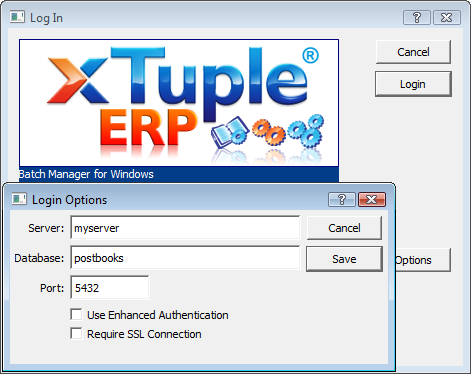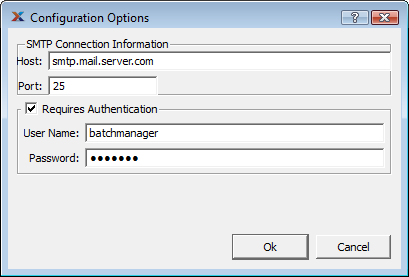Installing the Batch Manager client is simple. In fact, there is no formal installation procedure on any platform. Simply download the client application to a location on your machine that makes sense to you. Then run the application—either by double-clicking on it or however you run programs on your operating system.
If you purchased the Batch Manager on the xTuple xChange, then you should already have the Batch Manager client file.
Note
Depending on which edition of xTuple ERP you are running, it may be possible to download the required files from the "Commercial Software" section of the xtuple.org website.
The name of the file will differ depending on the operating system you are running the Batch Manager on. The following file names correspond to the different support platforms:
- Windows
BatchManager.exe- Mac
BatchManager.app- Linux
BatchManager
After you have downloaded the Batch Manager client, run the application—then select the OPTIONS button. The following screen will appear:

Enter your Server, Database, and Port information, select SAVE and then log on with the username and password for your xTuple Administrator user. This is normally "admin". And that's all there is to it!
Tip
Remember to keep the Batch Manager client logged in to your xTuple ERP database at all times. If you close the Batch Manager client, that effectively shuts down the Batch Manger. To restart the Batch Manager, simply re-run the client and connect to your xTuple ERP database.
Now that the Batch Manager is connected to your xTuple ERP database, we can configure the Batch Manager client options. To configure the client options, follow these steps:
Select the "Tools" menu
Select "Options" to open the Configuration Options screen
Specify an SMTP host
Specify an SMTP port (default = 25)
Select the "Requires Authentication" option if required by SMTP host
Enter user name and password information, as shown below:

Note
The account you use must not require any encryption to authenticate to the mail server.
To save your configuration settings, select the OK buttons. Then leave the Batch Manager running.
Note
See the System Administration chapter for information about command line arguments you can pass at startup to automate the execution of the Batch Manager. The command line arguments also enable you to fine tune how often the Batch Manager checks for new jobs.